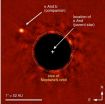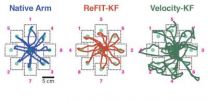(Press-News.org) "Our analysis shows that the Norse in Greenland ate lots of food from the sea, especially seals," says Jan Heinemeier, Institute of Physics and Astronomy, Aarhus University.
"Even though the Norse are traditionally thought of as farmers, they adapted quickly to the Arctic environment and the unique hunting opportunities. During the period they were in Greenland, the Norse ate gradually more seals. By the 14th century, seals made up between 50 and 80 per cent of their diet."
The Danish and Canadian researchers are studying the 80 Norse skeletons kept at the University of Copenhagen's Laboratory of Biological Anthropology in order to determine their dietary habits. From studying the ratio of the isotopes carbon-13 and carbon-15, the researchers determined that a large proportion of the Greenlandic Norse diet came from the sea, particularly from seals. Heinemeier measured the levels of carbon isotopes in the skeletons, Erle Nelson of Simon Fraser University, in Vancouver, Canada, analysed the isotopes, while Niels Lynnerup of the University of Copenhagen, examined the skeletons.
"Nothing suggests that the Norse disappeared as a result of a natural disaster. If anything they might have become bored with eating seals out on the edge of the world. The skeletal evidence shows signs that they slowly left Greenland. For example, young women are underrepresented in the graves in the period toward the end of the Norse settlement. This indicates that the young in particular were leaving Greenland, and when the numbers of fertile women drops, the population cannot support itself," Lynnerup explains.
Hunters and farmers
The findings challenge the prevailing view of the Norse as farmers that would have stubbornly stuck to agriculture until they lost the battle with Greenland's environment. These new results shake-up the traditional view of the Norse as farmers and have given archaeologists reason to rethink those theories.
"The Norse thought of themselves as farmers that cultivated the land and kept animals. But the archaeological evidence shows that they kept fewer and fewer animals, such as goats and sheep. So the farming identity was actually more a mental self-image, held in place by an over-class that maintained power through agriculture and land ownership, than it was a reality for ordinary people that were hardly picky eaters," Jette Arneborg, archaeologist and curator at the National Museum of Denmark, says.
The first Norse settlers brought agriculture and livestock such as cattle, sheep, goats and pigs from Iceland. While they thought of themselves as farmers, they were not unfamiliar with hunting.
They quickly started to catch seals, as they were a necessary addition to their diet. Toward the end of their stay, they became as accustomed to catching seals as the Inuit, who had travelled to Greenland from Canada around the year 1200 and inhabited the island alongside the Norse. Seals became more important for Norse survival as the climate began to change over time and it became increasingly difficult to sustain themselves through farming.
"The Norse could adapt, but how much they could adapt without giving up their identity was limited. Even though their diet became closer to that of the Inuit, the difference between the two groups was too great for the Norse to become Inuit," Arneborg says.
### The isotopic analysis is an interdisciplinary collaboration between Aarhus University, the University of Copenhagen, the National Museum of Denmark and Simon Fraser from the University in Vancouver. The research is financed by the Carlsberg Foundation and the results will be presented in a series of articles in the Journal of the North Atlantic, Special Volume 3, 2012.
Facts about the Norse:
The Norse settled in Greenland around the year 1000 AD. Erik the Red arrived from Iceland as the first to settle in southern Greenland. At its height, the Norse population of Greenland reached between 2,000 and 3,000. They settled in western Greenland, near modern-day Nuuk, and in south-western Greenland, near modern-day Narsaq and Qaqartoq. They traded with Greenlandic Inuit and supplied Europe with Walrus tusks. They explored America and established a settlement there 500 years before Columbus arrived. The Norse populated Greenland until the beginning of the 15th century, when they disappeared without a trace. The Old Norse culture is the only example of a highly developed Western society that disappeared without any sources describing why.
Contact:
Professor Niels Lynnerup, Laboratory of Biological Anthropology, University of Copenhagen; Tel: +45 35 32 72 39. Mobile: +45 28 75 72
Jan Heinemeier, lecturer and head of the Institute of Physics and Astronomy, Aarhus University; Tel: +45 87 15 52 59, Mobile: +45 23 38 23 18
Jette Arneborg, senior researcher and curator, National Museum of Denmark; Tel: +45 41 20 61 14
Greenland's viking settlers gorged on seals
2012-11-19
ELSE PRESS RELEASES FROM THIS DATE:
TGen, Scottsdale Healthcare lead worldwide study of new drug for patients with pancreatic cancer
2012-11-19
SCOTTSDALE, Ariz. — A new cancer drug combination demonstrated significant improvement in overall survival of late-stage pancreatic cancer patients compared to those receiving standard treatment, according to results of a Phase III clinical trial led by physicians from Scottsdale Healthcare's Virginia G. Cancer Center Clinical Trials, a partnership with the Translational Genomics Research Institute (TGen).
Physicians at the Virginia G. Piper Cancer Center at Scottsdale Healthcare were first to design a clinical trial to determine the safety, tolerability and effectiveness ...
Can't stop? Smoking less helps
2012-11-19
Countless studies demonstrate the virtues of complete smoking cessation, including a lowered risk of disease, increased life expectancy, and an improved quality of life. But health professionals acknowledge that quitting altogether can be a long and difficult road, and only a small percentage succeed.
Every day, doctors are confronted with patients who either cannot or will not quit, says Vicki Myers, a researcher at Tel Aviv University's Sackler Faculty of Medicine. To address this reality, Myers and her fellow researchers, Dr. Yariv Gerber and Prof. Uri Goldbourt of ...
Astrophysicists identify a 'super-Jupiter' around a massive star
2012-11-19
TORONTO, ON – Astrophysicists at the University of Toronto and other institutions across the United States, Europe and Asia have discovered a 'super-Jupiter' around the massive star Kappa Andromedae. The object, which could represent the first new observed exoplanet system in almost four years, has a mass at least 13 times that of Jupiter and an orbit somewhat larger than Neptune's.
The host star around which the planet orbits has a mass 2.5 times that of the Sun, making it the highest mass star to ever host a directly observed planet. The star can be seen with the naked ...
School exclusion policies contribute to educational failure, study shows
2012-11-19
AUSTIN, Texas — "Zero- tolerance" policies that rely heavily on suspensions and expulsions hinder teens who have been arrested from completing high school or pursuing a college degree, according to a new study from The University of Texas at Austin.
In Chicago, 25,000 male adolescents are arrested each year. One quarter of these arrests occurred in school, according to the Chicago Police Department. The stigma of a public arrest can haunt an individual for years — ultimately stunting academic achievement and transition into adulthood, says David Kirk, associate professor ...
Call to modernize antiquated climate negotiations
2012-11-19
The structure and processes of United Nations climate negotiations are "antiquated", unfair and obstruct attempts to reach agreements, according to research published today.
The findings come ahead of the 18th UN Climate Change Summit, which starts in Doha on November 26.
The study, led by Dr Heike Schroeder from the University of East Anglia (UEA) and the Tyndall Centre for Climate Change Research, argues that the consensus-based decision making used by the United Nations Framework Convention on Climate Change (UNFCCC) stifles progress and contributes to negotiating ...
A better thought-controlled computer cursor
2012-11-19
When a paralyzed person imagines moving a limb, cells in the part of the brain that controls movement still activate as if trying to make the immobile limb work again. Despite neurological injury or disease that has severed the pathway between brain and muscle, the region where the signals originate remains intact and functional.
In recent years, neuroscientists and neuroengineers working in prosthetics have begun to develop brain-implantable sensors that can measure signals from individual neurons, and after passing those signals through a mathematical decode algorithm, ...
Fabrication on patterned silicon carbide produces bandgap to advance graphene electronics
2012-11-19
By fabricating graphene structures atop nanometer-scale "steps" etched into silicon carbide, researchers have for the first time created a substantial electronic bandgap in the material suitable for room-temperature electronics. Use of nanoscale topography to control the properties of graphene could facilitate fabrication of transistors and other devices, potentially opening the door for developing all-carbon integrated circuits.
Researchers have measured a bandgap of approximately 0.5 electron-volts in 1.4-nanometer bent sections of graphene nanoribbons. The development ...
Breakthrough nanoparticle halts multiple sclerosis
2012-11-19
New nanoparticle tricks and resets immune system in mice with MS
First MS approach that doesn't suppress immune system
Clinical trial for MS patients shows why nanoparticle is best option
Nanoparticle now being tested in Type 1 diabetes and asthma
CHICAGO --- In a breakthrough for nanotechnology and multiple sclerosis, a biodegradable nanoparticle turns out to be the perfect vehicle to stealthily deliver an antigen that tricks the immune system into stopping its attack on myelin and halt a model of relapsing remitting multiple sclerosis (MS) in mice, according ...
Research breakthrough selectively represses the immune system
2012-11-19
Reporters, please see "For news media only" box at the end of the release for embargoed sound bites of researchers.
In a mouse model of multiple sclerosis (MS), researchers funded by the National Institutes of Health have developed innovative technology to selectively inhibit the part of the immune system responsible for attacking myelin—the insulating material that encases nerve fibers and facilitates electrical communication between brain cells.
Autoimmune disorders occur when T-cells—a type of white blood cell within the immune system—mistake the body's own tissues ...
International team discovers likely basis of birth defect causing premature skull closure in infants
2012-11-19
(SACRAMENTO, Calif.) -- An international team of geneticists, pediatricians, surgeons and epidemiologists from 23 institutions across three continents has identified two areas of the human genome associated with the most common form of non-syndromic craniosynostosis ― premature closure of the bony plates of the skull.
"We have discovered two genetic factors that are strongly associated with the most common form of premature closure of the skull," said Simeon Boyadjiev, professor of pediatrics and genetics, principal investigator for the study and leader of the International ...

